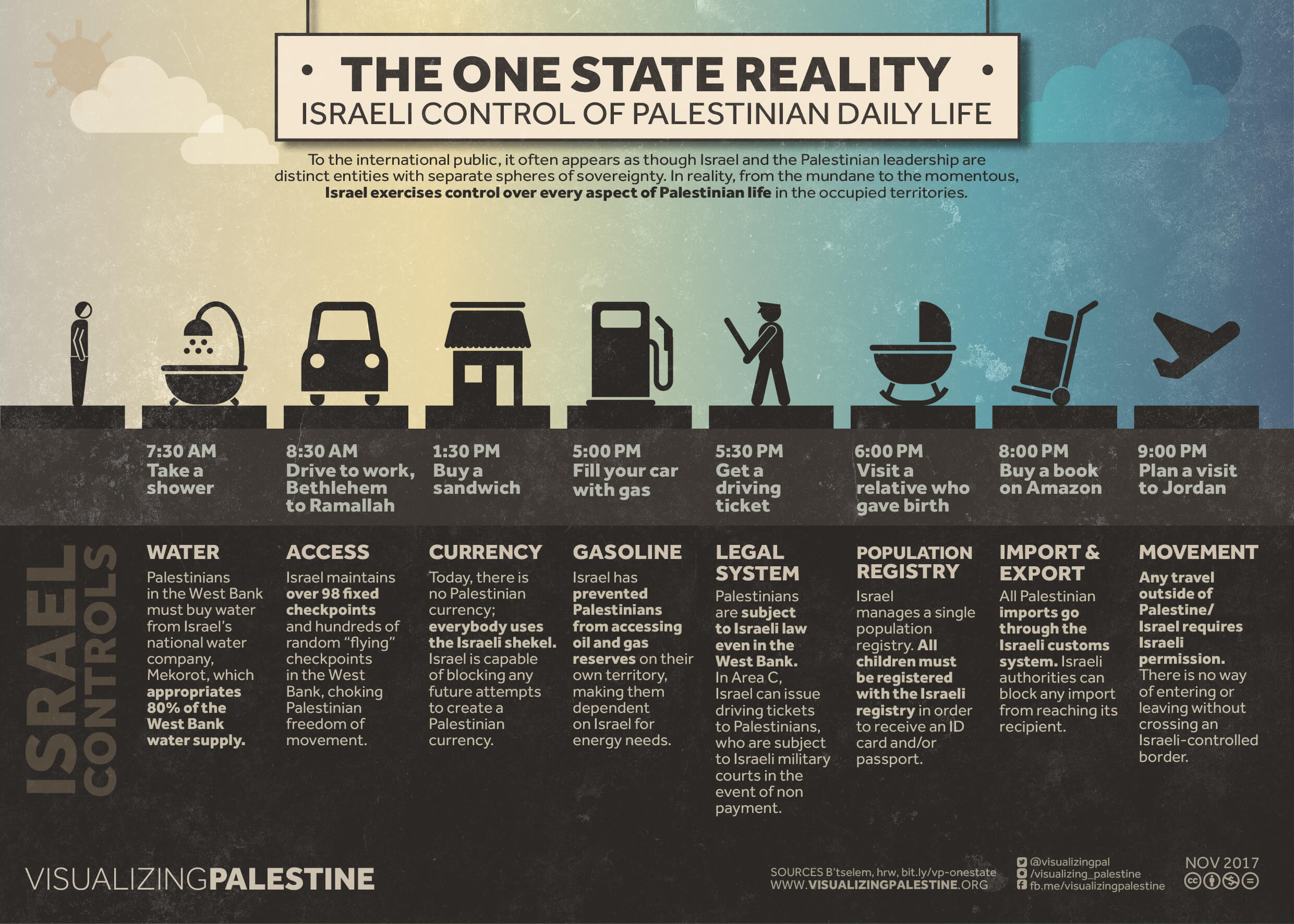A state of de facto annexation already exists on the ground in most of the occupied West Bank.
Almost two-thirds of the Palestinian territory, including most of its most fertile and resource-rich land, is under full Israeli control. About 400,000 Jewish settlers living there enjoy the full rights and privileges of Israeli citizens.
At least 60 pieces of legislation were drafted by right-wing members of the Knesset during the last parliament to move Israel from a state of de facto to de jure annexation, according to a database by Yesh Din, an Israeli human rights group.
Yesh Din points out that the very fact that some of these bills have passed as laws constitutes a form of annexation: “The Israel Knesset [now] regards itself as the legislative authority in the West Bank and the sovereign there.”
Paradoxically, many of those bills were opposed by Israeli Prime Minister Benjamin Netanyahu, even though they were drafted from within his own ruling coalition.
Netanyahu argued that it would be wrong to pre-empt US President Donald Trump’s peace plan, implying that annexation is high on the agenda.
Leaked details suggest that Washington is now preparing to green-light the formal annexation of at least some of that territory as part of its deal-making, though Netanyahu’s political difficulties and his decision to call another election in September could mean putting details on ice once again.
The Golan precedent
Three recent developments have also brought the idea of Israel annexing parts or all of the West Bank onto the agenda.
In March, US President Donald Trump recognised Israel’s sovereignty over the Golan Heights, seized from Syria during the 1967 war and annexed by Israel in 1981 in violation of international law. The US decision suggested a precedent whereby it might similarly approve a move by Israel to annex the West Bank.
In April, in the run-up to Israel’s general election, Netanyahu said he would use the next parliament to “extend sovereignty” to all illegal Jewish settlements in the West Bank, using a phrase preferred by Israeli politicians to “annexation”.
About 400,000 settlers live in the West Bank in 150 official settlements and another 120 so-called “unauthorised” outposts that have been covertly sponsored by the Israeli state since the 1990s. These settlements have jurisdiction over 42 percent of West Bank territory.
In early June, the US ambassador to Israel, David Friedman, a stalwart supporter of the settlements and one of the architects of Trump’s supposed “deal of the century”, told the New York Times that he believed Israel was “on the side of God” and said: “Under certain circumstances, I think Israel has the right to retain some, but unlikely all, of the West Bank.”
Support in Israel growing
Support in Israel for annexation is growing, with 42 percent backing one of several variants in a recent poll, as opposed to 34 percent who were behind a two-state solution. Only 28 percent of Israelis explicitly rejected annexation.
Behind the scenes, debates about formally annexing the Palestinian territories have been rife in Israel since it occupied the West Bank, East Jerusalem, and Gaza in 1967.
Successive Israeli governments, however, have demurred out of concern both that there would be strong international objections (most UN member states would be opposed to the annexation of territory recognised as illegally occupied in international law) and that Israel would be under pressure to give Palestinians in annexed areas citizenship, including the right to vote, that would undermine its Jewish majority.
Senior government ministers such as Moshe Dayan and Yigal Allon were among the early proponents of annexing parts of the West Bank. They drew up maps for a permanent settlement programme that would allow Israel to hold on to swathes of the West Bank, especially the most fertile land and the aquifers.
Through the late 1970s and 1980s, a justice ministry official, Plia Albeck, declared large areas of the West Bank “state land”, allowing the government to treat it as effectively part of Israel and build settlements.
Speeding tickets and police stations
Israel has applied its laws to the settler population and dozens of Israeli police stations located in the West Bank operate as if the territory has been annexed, issuing speeding tickets and enforcing other infractions on Palestinians. Palestinians’ ultimate recourse to adjudication on legal matters is Israel’s Supreme Court.
In 2011, that court decided that Israel was allowed to exploit more than a dozen quarries, one of the Palestinians’ key resources, because the occupation had become “prolonged” – a ruling that treated the West Bank as if it had been de facto annexed.

The one state reality | Visualizing Palestine
Since the Olso accords, Israeli leaders have tended to pay lip service to Palestinian statehood, at some distant future point. But in practice, they have encouraged the rapid expansion of the settlements. This policy is sometimes referred to as “creeping annexation”.
A number of variants have been advanced by the Israeli right, ranging from the annexation of all Palestinian territories, including Gaza, to annexation limited to certain areas of the West Bank.
How Oslo gave Israel control
The main framework for the Israeli debate about annexation is the Oslo process which temporarily carved up the occupied West Bank into Areas A, B and C as a prelude, it was assumed, to eventually transferring sovereignty to the Palestinian Authority.
Area C, 62 per cent of the West Bank, is under full Israeli control and where the settlements are located. It is also where most of the water, agricultural and mineral resources are to be found.
Area B, 20 percent, is under Israeli security control and Palestinian civil control. And Area A – mainly Palestinian built-up areas on 18 percent of the West Bank – is nominally under full Palestinian control.
The option favoured by most of Netanyahu’s Likud party involves the annexation of areas populated with settlers, or about 40 percent of the West Bank mostly located in Area C.
This option would keep West Bank Palestinians outside the annexed areas and make it easier to avoid conferring any residency or citizenship rights on them. The Palestinian Authority would be given “limited autonomy” – a kind of glorified municipal role – over the remaining fragments of the West Bank.
To the right of Likud, opinions range from annexing all of Area C to annexing the entire West Bank and Gaza, and the creation of Palestinian “Bantustans” modelled on South Africa’s racist apartheid system. Some propose a “salami” method, with Israel gradually slicing off more of the West Bank.
The Israeli centre-left fears formal annexation not only violates international law but will damage Israel’s image abroad by encouraging comparisons with apartheid-era South Africa. In the absence of a Palestinian state, a minority of Jews might soon be ruling over a majority of Palestinians.
The centre-left is also concerned about the costs of annexation. Commanders for Israel’s Security, a group of retired security officials, argue that annexation will lead to the inevitable collapse of the Palestinian Authority.
As a result, they believe Israel would incur annual costs of between $2.3bn and $14.5bn, depending on the extent of the West Bank area annexed. There would also be a loss of $2.5bn in foreign investments. Palestinian uprisings could cost Israel’s economy as much as $21bn.
Right-wing economists like Amatzia Samkai of the Caucus for Eretz Israel say Israel will benefit economically. If Area C is annexed, only a small number of Palestinians will be entitled to Israeli welfare payments, he says. Such costs, he adds, can be more than offset by an expanded labour force and a drop in real-estate prices after West Bank land is freed up for house building by Israelis.
Knesset ‘sovereign’ in West Bank already
Of the 60 pieces of draft annexation legislation brought before the Knesset, eight have passed into law.
The main laws that have been passed include:
- annulling a special council overseeing higher education in West Bank settlements and transferring its powers to the main Israel Council for Higher Education.
- approving retroactively the theft of private Palestinian land used to build settlements. The previous official position was that settlements should be built only on land Israel had declared state land because it was not owned by Palestinians.
- extending benefits available in Israel – from tax exemptions and egg production quotas to renewable energy investments – to West Bank settlements.
- unifying the criminal register used by police in Israel and the West Bank.
- transferring powers to adjudicate matters involving the West Bank to lower courts in Israel.
- prohibiting businesses from refusing to supply services to West Bank settlements.
In addition, Yesh Din notes, Israel has recently shifted its diplomatic position and legal arguments to the courts in relation to the West Bank.
It has rejected the West Bank’s status as being under occupation, asserted Israel’s authority to operate there and eroded the obligation to protect the rights and property of the Palestinian population.

Palestinian observers watch as children walk past Israeli soldiers on their way to school in the West Bank city of Hebron following Israel’s expulsion of an international observer force from the Palestinian city, Feb. 12, 2019. Majdi Mohammed | AP
Another significant piece of legislation Netanyahu is known to favour – chiefly for personal reasons because it could be used to protect him from corruption indictments – is an Override Law.
The measure is being aggressively promoted by settler groups because it would strip Israel’s Supreme Court of judicial review powers to block legislation annexing the West Bank.
Palestinian support?
On the Palestinian side, a tiny number, mostly business leaders, have backed annexation of the West Bank. They have been cultivated by the Trump administration as a potential alternative leadership to the Palestinian Authority. Most Palestinians consider them traitors or collaborators.
Hebron businessman Ashraf Jabari, for example, has entered into a partnership with settler counterparts in the “Judea and Samaria Chamber of Commerce”, using the settlers’ Biblical name for the West Bank.
The chamber promotes joint ventures such as shopping centres along West Bank main roads, tourism initiatives and infrastructure projects.
Jabari and others have consciously sought to package annexation on Israeli terms as similar to the one-state agenda of a growing section of the Palestinian population, especially those supporting the boycott, divestment and sanctions movement (BDS).
“We have to think about this area as one entity, not two entities and two realities,” he told journalists recently.
Certainly, there are Palestinians who consider annexation and Israel’s direct re-occupation of the West Bank, unmediated by the PA, as a necessary condition for Palestinians launching a civil rights or anti-apartheid struggle to realise a genuine one-state solution.
Feature photo | This Oct. 28, 2016, photo shows the Israeli settlement of Bait Hagay through a barbed wire fence that secures the perimeter, south of the West Bank city of Hebron. Nasser Shiyoukhi | AP
Jonathan Cook won the Martha Gellhorn Special Prize for Journalism. His latest books are Israel and the Clash of Civilisations: Iraq, Iran and the Plan to Remake the Middle East (Pluto Press) and Disappearing Palestine: Israel’s Experiments in Human Despair (Zed Books). His website is www.jonathan-cook.net.
Source | JonathanCook.net
The post Annexation: How Israel Already Controls More Than Half of the West Bank appeared first on MintPress News.
